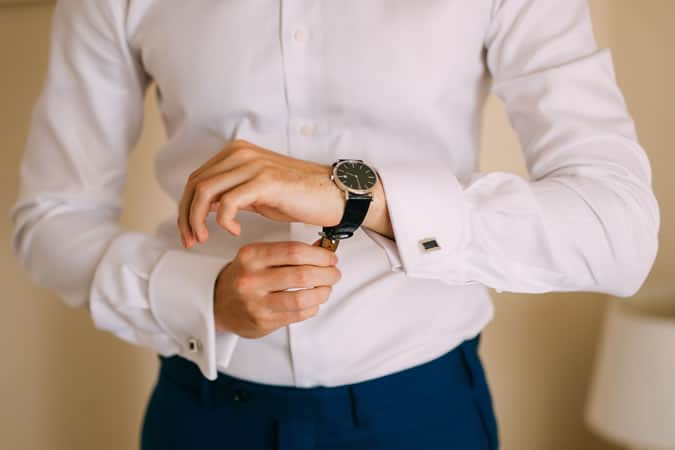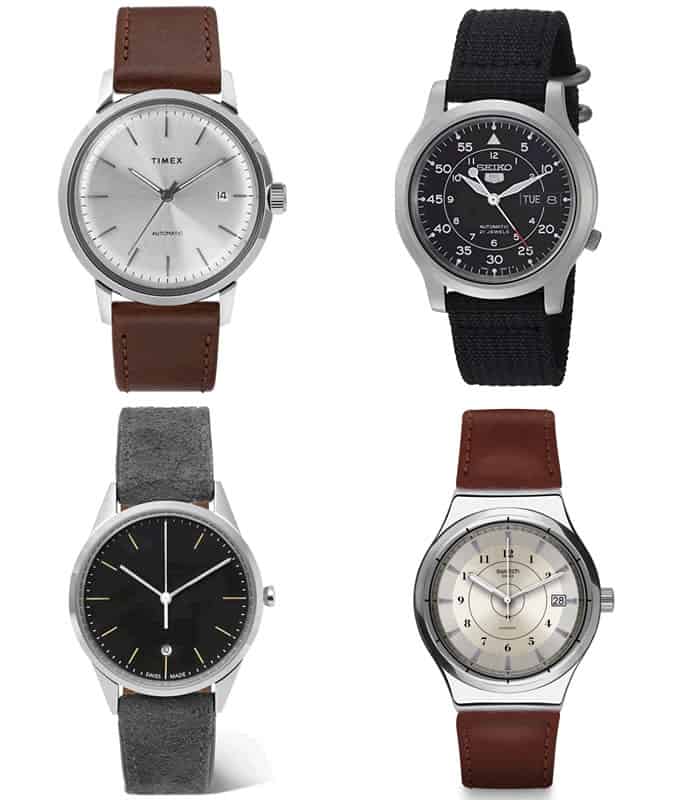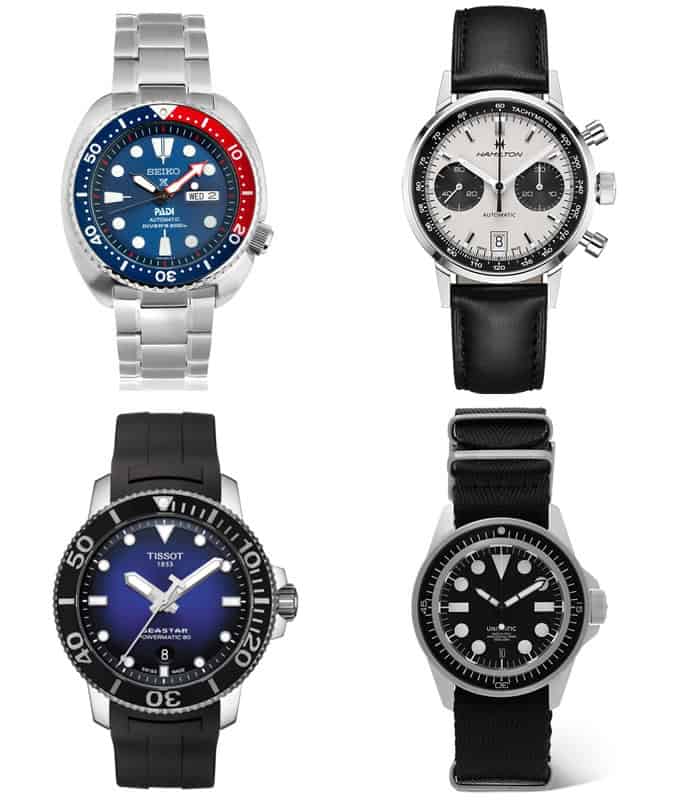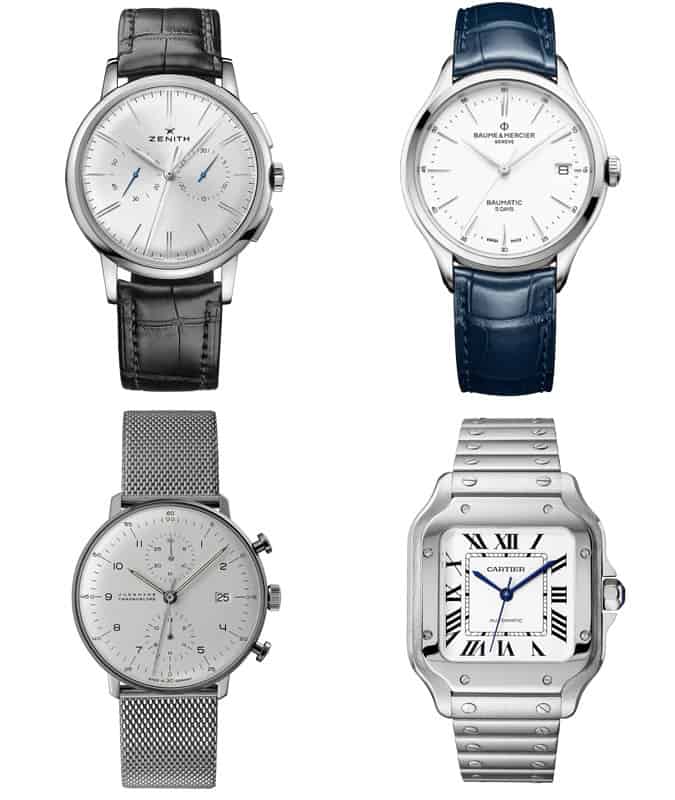Jewellery is tough to pull off if you don’t make your money spitting bars. Which is a large part of why men obsess over watches. Turn up to a business lunch with inch-thick gold draped around your neck and you’re getting seated by the bathrooms. But if it’s around your wrist? “Please, sir, do follow me to the chef’s table”.
But you can’t rely on one knockout timepiece. As with your wardrobe, a deep wrist rotation allows for better dressing and the chance to switch up your style. Trust us – an alarm clock-faced pilot’s watch glinting on your wrist kills your black tie look as much as a pair of Air Jordans (got that, Ed Sheeran?).
A sports-led chronograph on a steel bracelet may fit the boardroom, but it’s by no means classic enough for a wedding. Which means unless you’re fine wearing the same outfit everywhere, you need multiple options.
That’s all well and good, you say, but there’s the small matter of the five-figure price tag on a Jaeger-LeCoultre Master Ultra Thin dress watch. Dropping a house deposit on something designed for red carpets isn’t realistic unless you’re walking them regularly. Thanks be, then, for the subtle – but important – distinction between a watch wardrobe, and a watch collection.
What Is A Watch Wardrobe?
A ‘watch collection’ is for men who describe themselves, without a glimmer of irony, as ‘horologists’. Those who don’t think: “Does that blue face work with this bomber jacket?”, but “Which of my pinstripe navy suits should I wear with the Patek?” Watch collections tend to appreciate in safes, as multi-thousand pound piles of precious metal.
“Connoisseurs can collect timepieces that never see daylight or complement their owner,” says Damian Otwinowski, Vice President of Watches of Switzerland. “That’s an injustice to the craftsmanship.” Or, you know, the equivalent of Smaug the dragon lounging on his pile of treasure.

A watch wardrobe, however, is a group of timepieces that let you set off whatever you’re wearing just so. “We change our skin often,” says Otwinowski. “A watch should be an extension of your attitude, personality and mood.” So these are pieces that actually spend time on your wrist, rather than gathering dust.
A watch wardrobe can be spendy, if you’ve got the means, but needn’t be if you haven’t. The key is that what’s in it gets worn, and that each element is bought with an understanding of how it’ll work with what you wear.
How To Start Your Own
Building a watch wardrobe, then, means covering bases. Some say that every man needs three watches: one for the office, one for the weekend and something plain-faced for formal dinners that tells nothing other than the time and how refined your taste is. And of course, a watch box. Fine if you’re Don Draper. Less so if you’re more often in nightclubs than those reserved for private members.
So, although the trio stands, it needs updating. A good place to start is with a classic dress watch, before moving onto something sporty. Lastly, a statement piece comes in handy for special occasions – think weddings, parties and generally events that require you to dress up. It’s ok to go fancy here. You want something with enough jazz to separate it from your dress watch daily – it should feel special when you strap it on; the wrist equivalent of putting on a bespoke suit.

The classic and sports should ideally have something to do with either your job – if you’re a seaman, then think Rolex Yacht-Master over a pilot’s watch like a Breitling Navitimer – or your hobbies. For keen cooks, a plain-faced chronograph, like a IWC Portugieser, means a better outfit in the office and perfect pasta in the kitchen.
The Ground Rules Of A Watch Wardrobe
There are some ground rules to watch-clothing styling. First, leathers and metals should match. If you’re wearing brown shoes, or carrying a chocolate folio, you need to switch that black crocodile skin. And if you’re wearing any gold jewellery – probably your wedding ring and cufflinks, unless you’re in the A$AP Mob – don’t wear a silver bracelet. Yes, that includes steel.

Beyond that, it’s about matching aesthetic to environment. As a rule of thumb, the more practical your watch, the less formal the occasion you wear it for. You shouldn’t need to time anything at a wedding (it won’t make the best man’s speech go faster, although – take our word for it – champagne will) so there’s no need to wear a diving watch.
Technically, tradition dictates that if you’re in a dinner jacket, you shouldn’t be wearing a watch at all as you’re having too much fun to worry about the time. But there’s always your phone if you’re not.
The First Watch: The Simple One
Your first watch, then, should be something adaptable. There’s no point dropping your hard-earned on a dress watch if you live in streetwear, or a model with more dials than a call centre when you work in pensions in the city.
You also don’t want to blow the bank, even if you’re a watch lover. Your first watch sets a benchmark you’re unlikely to dip below, so be sensible and look to upgrade later. The idea here is to go with something simple, that’ll be just as stylish in ten years as it is now. Stick with minimal time-only pieces, maybe by microbrands, that work well with both formal and casual dress – think slim hands, paired back hour markers and small case sizes.
Key Features: Minimal dial, understated design
Price Point: £100 – £500
When To Wear It: Every day, to the office
Key Pieces

The Second Watch: The Sporty One
Next comes something with more personality. Sports watches are inevitably less formal than dress watches – they tend to feature additional complications such as chronographs or diving bezels which add to their complexity and make them more appropriate for laid back attire.
Depending on the model you go for, a sports watch may well be the most versatile piece in your rotation. Get a classically styled one, a Tissot Seastar or a Seiko diver perhaps, and you’ll be able to wear it with just about anything, apart from your sharpest business suit or a tuxedo that is.
Sports watches should technically be hardier than slighter models due to their functional nature – they’re often waterproof and made from chunkier steel so they can take a knock or two. As such, your weekend shouldn’t be without one. Due to their more complex functions however, sports watches with mechanical movements are usually much more expensive than equivalent dress watches, not taking into account pieces made from precious metal.
Key Features: Rugged design, a complication (i.e. chronograph or diving bezel)
Price Point: £400 – £2,000
When To Wear It: At the weekend, with casual attire
Key Pieces

The Third Watch: The Statement One
Finally, your statement watch. Perhaps counter-intuitively, there’s an argument to be made that less wear means you should spend more. You get the pleasure of breaking out something special, and run less risk of it getting battered. But statement needn’t mean over-the-top. We’re not talking about gaudy colours and oversized dials here – statements can be classy too, and (a tad) expensive.
As far as where to start, Baume & Mercier’s Baumatic range (from £2,300) is unobtrusive but – with its simple hour markers and in-house movement – still has personality and is a great option for a first time investment piece. If you’ve saved the pennies, Zenith’s Elite Classic (£5,500) dresses up thanks to its beautifully elegant dial, but the chronograph adds a ruggedness that means you won’t have to wait for a black tie ball to break it out.
Just remember, mechanical watches aren’t like their workhorse quartz cousins. Good watches are like car engines, they need to be maintained every couple of years or otherwise they risk loosing performance.
And just as you wouldn’t take that finely tuned Ferrari to the supermarket, don’t risk damaging your tourbillon on the trolley. That said, remember to – when appropriate – actually wear it. You don’t want your wardrobe to become a security box.
Key Features: A point of difference (ie precious metal, in-house movement, iconic design)
Price Point: £1,000 – £5,000+
When To Wear It: On special occasions, when you want to show off
Key Pieces

Read the original article here



